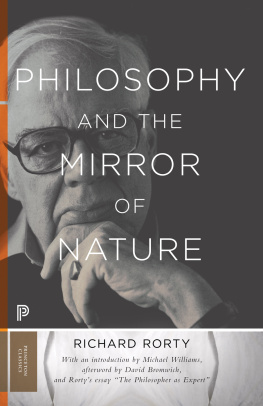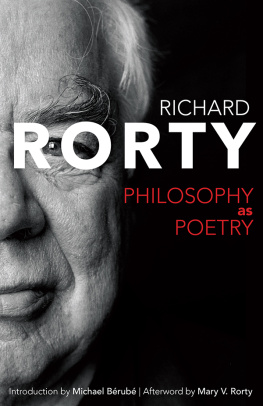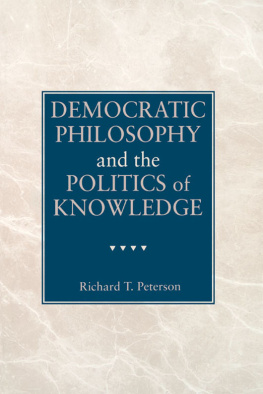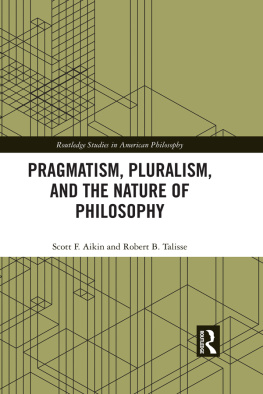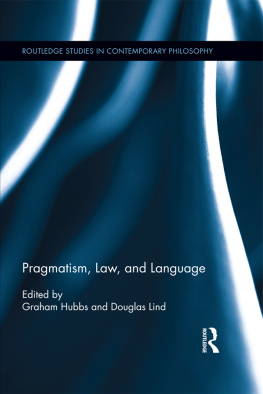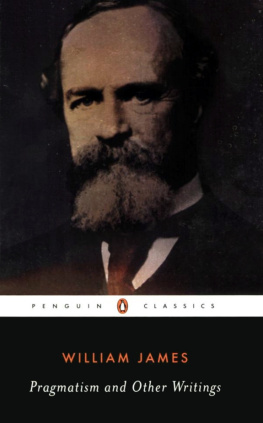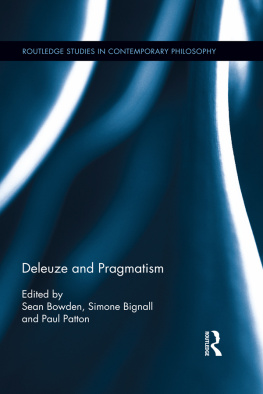PENGUIN BOOKS
PHILOSOPHY AND SOCIAL HOPE
Richard Rorty was educated at the University of Chicago and Yale. He has been Stuart Professor of Philosophy at Princeton University and Emeritus Professor of Humanities at the University of Virginia; he is presently Professor of Comparative Literature at Stanford University. He is the author of Philosophy and the Mirror of Nature, Contingency, Irony and Solidarity and Achieving Our Country: Leftist Thoughts in Twentieth-Century America.
RICHARD RORTY
Philosophy and Social Hope

PENGUIN BOOKS
PENGUIN BOOKS
Published by the Penguin Group
Penguin Books Ltd, 80 Strand, London WC2R 0RL, England
Penguin Putnam Inc., 375 Hudson Street, New York, New York 10014, USA
Penguin Books Australia Ltd, 250 Camberwell Road, Camberwell, Victoria 3124, Australia
Penguin Books Canada Ltd, 10 Alcorn Avenue, Toronto, Ontario, Canada M4V 3B2
Penguin Books India (P) Ltd, 11 Community Centre, Panchsheel Park, New Delhi 110 017, India
Penguin Books (NZ) Ltd, Cnr Rosedale and Airborne Roads, Albany, Auckland, New Zealand
Penguin Books (South Africa) (Pty) Ltd, 24 Sturdee Avenue, Rosebank 2196, South Africa
Penguin Books Ltd, Registered Offices: 80 Strand, London WC2R 0RL, England
www.penguin.com
First published in Penguin Books 1999
This collection copyright Richard Rorty, 1999
The Acknowledgements on constitute an extension of this copyright page
All rights reserved
The moral right of the author has been asserted
Except in the United States of America, this book is sold subject to the condition that it shall not, by way of trade or otherwise, be lent, re-sold, hired out, or otherwise circulated without the publishers prior consent in any form of binding or cover other than that in which it is published and without a similar condition including this condition being imposed on the subsequent purchaser
ISBN: 978-0-14-194611-5
To the University of Virginia
Contents
Acknowledgements
The pieces in this book were originally published in the following places (copyright Richard Rorty unless otherwise marked):
Introduction: Relativism: Finding and Making: Debating the State of Philosophy: Habermas, Rorty and Kolokowski, Jozef Niznik and John T. Sanders, eds. (Praeger, 1996). Copyright Institute of Philosophy and Sociology of the Polish Academy of Science, 1996. Reprinted by permission.
1. Trotsky and the Wild Orchids: Wild Orchids and Trotsky: Messages from American Universities, Mark Edmundson, ed. (New York: Viking, 1993). Copyright Viking, 1993. Reprinted by permission.
2. Truth without Correspondence to Reality: First appearance in English; a German translation appeared in my Hoffnung statt Erkentniss (Vienna: Passagen Verlag, 1994); a French translation appeared in my Lespoir au lieu de savoir (Paris: Albin Michel, 1995).
3. A World without Substances or Essences: First appearance in English; a German translation appeared in my Hoffnung statt Erkentniss (Vienna: Passagen Verlag, 1994); a French translation appeared in my Lespoir au lieu de savoir (Paris: Albin Michel, 1995).
4. Ethics without Principles: First appearance in English; a German translation appeared in my Hoffnung statt Erkentniss (Vienna: Passagen Verlag, 1994); a French translation appeared in my Lespoir au lieu de savoir (Paris: Albin Michel, 1995).
5. The Banality of Pragmatism and the Poetry of Justice: Pragmatism in Law and Society, Michael Brint and William Weaver, eds. (Boulder, Colorado: Westview Press, 1991), pp. 8997. First published in Southern California Law Review. Copyright Southern California Law Review, 1990. Reprinted by permission.
6. Pragmatism and Law: A Response to David Luban: Cardozo Law Review, vol. XXVIII, no. 1. Copyright 1996, Yeshiva University. Reprinted by permission.
7. Education as Socialization and as Individualization: originally published as Education without Dogma, Dissent (Spring 1989), pp. 198204. Copyright Dissent, 1989. Reprinted by permission.
8. The Humanistic Intellectual: Eleven Theses: ACLS Occasional Papers (November 1989), no. 10, pp. 912. Reprinted by permission.
9. The Pragmatists Progress: Umberto Eco on Interpretation: Interpretation and Overinterpretation, Stefan Collini, ed. (Cambridge: Cambridge University Press, 1992), pp. 89108. Copyright Cambridge University Press, 1992. Reprinted by permission.
10. Religious Faith, Intellectual Responsibility and Romance: The Cambridge Companion to William James, Ruth Anna Putnam, ed. (Cambridge: Cambridge University Press, 1997), pp. 84102. Copyright Cambridge University Press, 1997. Reprinted by permission.
11. Religion as Conversation-stopper: Common Knowledge (Spring 1994), vol. III, no. 1, pp. 16. Copyright Common Knowledge, 1994. Reprinted by permission.
12. Thomas Kuhn, Rocks and the Laws of Physics: Common Knowledge (Spring 1997), vol. VI, no. 1. Copyright Common Knowledge, 1997. Reprinted by permission.
13. On Heideggers Nazism: Originally published as Another Possible World in the London Review of Books (8 February 1990), p. 21. Copyright London Review of Books, 1990. Reprinted by permission.
14. Failed Prophecies, Glorious Hopes: First appeared as Endlich sieht man Freudenthal in Frankfurter Allgemeine Zeitung, 20 February 1998. Copyright FAZ, 1998. Reprinted by permission.
15. A Spectre is Haunting the Intellectuals: Derrida on Marx: European Journal of Philosophy (December 1995), vol. III, no. 3, pp. 28998. Copyright European Journal of Philosophy, 1995. Reprinted by permission.
16. Love and Money: Common Knowledge (Spring 1992), vol. I, no. 1, pp. 1216. Copyright Common Knowledge, 1992. Reprinted by permission.
17. Globalization, the Politics of Identity and Social Hope: originally published as Global Utopias, History and Philosophy in Cultural Pluralism, Identity and Globalization, Luiz Soares, ed. (Rio de Janiero: UNESCO/ISSC/EDUCAM, 1996), pp. 45769.
18. Looking Backwards from the Year 2096: originally published as Fraternity Reigns in The New Times Magazine, 28 September 1996, pp. 1558.
19. The Unpatriotic Academy: The New York Times, 13 February 1994, section 4, p. 15 (op-ed page). Copyright The New York Times, 1994. Reprinted by permission.
20. Back to Class Politics: Dissent (Winter 1997), pp. 314. Copyright Dissent, 1997. Reprinted by permission.
Preface
Most of what I have written in the last decade consists of attempts to tie in my social hopes hopes for a global, cosmopolitan, democratic, egalitarian, classless, casteless society with my antagonism towards Platonism. These attempts have been encouraged by the thought that the same hopes, and the same antagonism, lay behind many of the writings of my principal philosophical hero, John Dewey.
Platonism in the sense in which I use the term does not denote the (very complex, shifting, dubiously consistent) thoughts of the genius who wrote the Dialogues. Instead, it refers to a set of philosophical distinctions (appearancereality, mattermind, madefound, sensibleintellectual, etc.): what Dewey called a brood and nest of dualisms. These dualisms dominate the history of Western philosophy, and can be traced back to one or another passage in Platos writings. Dewey thought, as I do, that the vocabulary which centres around these traditional distinctions has become an obstacle to our social hopes.


